

Grade 12 Geography
Geography grade 12 research tasks (topics) and memos (sba).
Geography Grade 12 Research Tasks (Topics) and Memos for: term 1, Term 2, Term 3 and Term 4
Assessment is a continuous planned process of identifying, gathering and interpreting information about the performance of learners, using various forms of assessment. It involves four steps: generating and collecting evidence of achievement; evaluating this evidence; recording the findings and using this information to understand and assist with the learners’ development to improve the process of learning and teaching. Assessment should be both informal (assessment for learning) and formal (assessment of learning). In both cases regular feedback should be provided to learners to enhance the learning experience.
School-based assessment (SBA) is a purposive collection of learners’ work that tells the story of learners’ efforts, progress or achievement in given areas. The quality of SBA tasks is integral to learners’ preparation for the final examinations.
This booklet serves as a resource of four exemplar SBA tasks to schools and subject teachers of Geography. SBA marks are formally recorded by the teacher for progression and certification purposes. The SBA component is compulsory for all learners. Learners who cannot comply with the requirements specified according to the policy may not be eligible to enter for the subject in the final examination.
The formal assessment tasks provide the teacher with a systematic way of evaluating how well learners are progressing. This publication includes tests, a project and a case study. Formal assessment tasks form part of a year-long formal programme of assessment. These tasks should not be taken lightly and learners should be encouraged to submit their best possible efforts for final assessment.
The teachers are expected to ensure that assessment tasks are relevant to and suitable for the learners being taught. Teachers should adapt the tasks to suit learners’ level of understanding and should be context-bound; however, they should also take cognisance of the requirements as set out in the Curriculum and Assessment Policy Statement (CAPS) document.
- 1 What Skills are Assessed for Research Tasks in Grade 12
- 2.0.1 Guideline: Geography Grade 12 Research Tasks
- 2.1 Geography Research Project Topics for Grade 12 South Africa
- 3 Step 2: Background information about an area of study
- 4 Step 3: Mapping
- 5 Step 4: Methods of data collection
- 6 Step 5: Analysis and synthesis of data
- 7 Step 6: Recommendations and possible solutions
- 8 Step 7: Conclusion – accept or reject the hypothesis
- 9 Step 8: Bibliography
- 10 More Geography Grade 12 Resources
- 11 Mid Latitude Cyclones Notes Grade 12
- 12 Geography Grade 12 2019 Exam Papers and Memos
- 13 Geography Grade 12 2020 Past Papers and Memos
- 14 Geography Grade 12 Research Tasks (Topics) and Memos (SBA)
- 15 Grade 12 Geography Exam Papers and Memos for 2019 September and November
- 16 Geography Mind the Gap study guide: Grade 12 Download
What Skills are Assessed for Research Tasks in Grade 12
The following skills are assessed. Some/All of these skills may be tested in any external examination:
- Gathering data
- Interpreting data
- Analysing data
- Comparing different sets of data
- Representing data in written, graphic or mapped format
- Problem-solving
- Drawing conclusions
- Hypothesis statements
Research framework for assessment (Guideline on administration of research task)
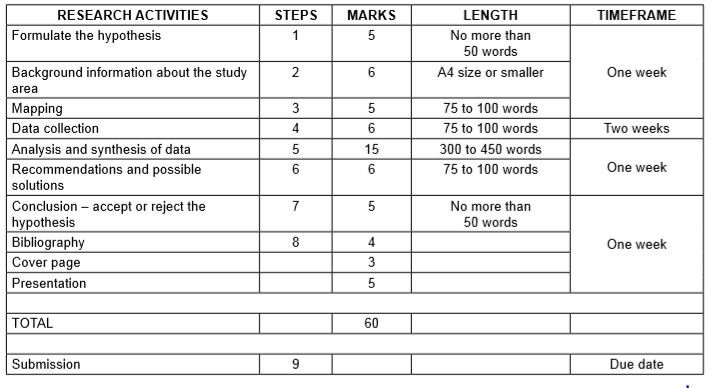
Step 1: Formulating a hypothesis/problem statement.
Guideline: geography grade 12 research tasks.
Step 1: Formulating a hypothesis/problem statement. As Geographers we seek to understand and explain the interactions amongst humans, and between humans and the environment in space and time. This is achieved by asking questions or making informed geographical decisions. This entails the development of a hypothesis or a problem statement to be tested.
- You have to choose a specific area of study where a geographical problem exists.
- During this stage, a geographical question showing a problem is asked.
- Identify the problem from a local area.
- Formulate a hypothesis or a problem statement. (Hypothesis research is used to prove that certain variables are dependent on or independent of each other. Problem statement research is only to highlight that a specific problem exists in a specific community.)
- You should then follow the steps of research to ensure that the geographical question is answered.
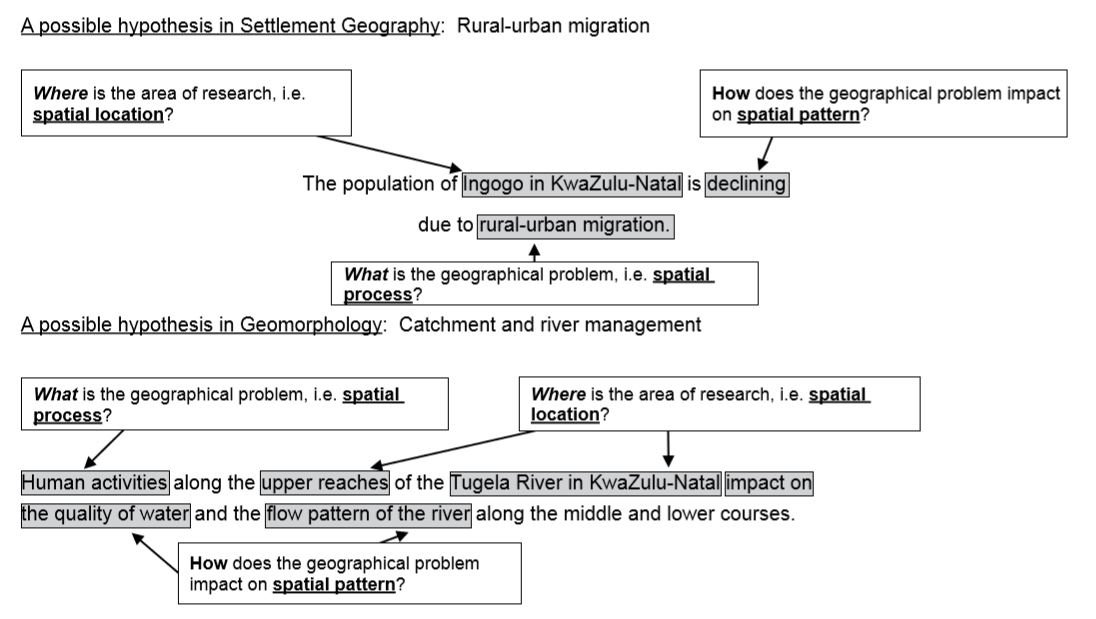
Geography Research Project Topics for Grade 12 South Africa
- The value of property along north-facing slopes is higher than the value of property along south-facing slopes in Meyersdal, Gauteng (choose local area).
- The cause of rural-urban migration in Ndwedwe, KwaZulu-Natal (choose local area), is the lack of service delivery in the health sector.
- Climate change will impact negatively on grape farming and related industries in the Western Cape.
- The closing down of many primary schools in Lusikisiki (Eastern Cape) (choose a local area) is due to a decline of the population in the age group 7 to 15 years.
- The poor condition of roads (specify the names of the roads) leading to/in Harrismith, Free State (choose local area), is due to the lack of proper planning by the local municipality.
- The impact of building a dam along the Jukskei River in Gauteng (choose local area) upstream of Alexandra will reduce flooding and the subsequent loss of life in Alexandra.
- The e-toll system will impact negatively on the economic position of people using private transport in Gauteng.
- The e-toll system will impact positively on traffic flow to the major urban centres in Gauteng.
- Informal settlements in the Vhembe district of Limpopo have low levels of development due to the lack of provision of basic needs (choose ONE informal settlement in your local area.)
- Overcrowding of informal settlements is due to the lack of proper planning by the local government (choose local area).
Step 2: Background information about an area of study
- You must explain where in South Africa the study area is located. (This can be indicated on the map.)
- Describe the study area in terms of its exact position (degrees, minutes and seconds).
- Provide relevant information about the area, for example population of the area or climate of the area.
Step 3: Mapping
- You must provide a map of the area in question.
- During this stage you must create a buffer zone around the area where the geographical problem exists.
- The map should have a clear legend/key and must be drawn to scale. The scale must be indicated on the map.
- If the map used covers a wider area, buffer zones around the area of study should be created.
- The map used should be the most recent map of the study area
Step 4: Methods of data collection
(a) PRIMARY DATA SOURCES
- The use of questionnaires
- Observations
- Field trips
(b) SECONDARY DATA SOURCES
- Newspaper articles
- Government department statistics
Step 5: Analysis and synthesis of data
• Learners must use collected data now to formulate a discussion around the existing geographical problem. • At this stage learners should represent some of the information graphically where necessary, for example graphs and sketches. • Learners must analyse graphic information during this stage.
Step 6: Recommendations and possible solutions
• Learners should now make recommendations to solve the geographical problem in question. • Learners should present their original and realistic opinions as far as they possibly can.
Step 7: Conclusion – accept or reject the hypothesis
- Learners should now take a decision to either ACCEPT or REJECT the hypothesis.
- Learners must give reasons for either ACCEPTING or REJECTING the hypothesis
Step 8: Bibliography
- Learners must include a comprehensive bibliography.
- Learners must list websites in full.
- Learners must include annexures of questionnaires and interviews conducted
More Geography Grade 12 Resources
- Geography 2020 Past Papers
- Geography 2019 Past Papers
Grade 12 Geography Exam Papers and Memos for 2019 September and November
- Geography Grade 12 Research Tasks (Topics) and Memos
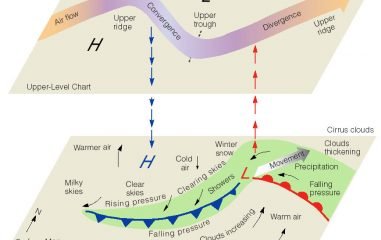
Mid Latitude Cyclones Notes Grade 12

- March 24, 2021

Geography Grade 12 2019 Exam Papers and Memos
- February 28, 2021

Geography Grade 12 2020 Past Papers and Memos

- February 22, 2021

- September 29, 2020
Geography Mind the Gap study guide: Grade 12 Download
- August 17, 2020
Read All Posts
Geography Grade 12 2020 Past Papers and Memos for study revision

You may like
Your email address will not be published. Required fields are marked *
Save my name, email, and website in this browser for the next time I comment.
Download Geography Grade 12 September 2020 Past Papers and Memos
Geography Grade 12 September 2020 Past Papers and Memos paper 1 and paper 2 pdf download
List of Geography Grade 12 September 2020 Past Papers and Memos
Geography grade 10, main reasons why is south africa regarded as a developing country.
Reasons why is South Africa regarded as a developing country: South Africa has a great economic infrastructure and natural resources that characterize its economy. In South Africa, there is outstanding progress in the field of industry and manufacturing. South Africa, however, is still characterised as a developing country and not a developed country.
- 0.1 6 Characteristics of a Developed Country
- 0.2 5 Reasons why is South Africa regarded as a developing country
6 Characteristics of a Developed Country
1. Has a high income per capita. Developed countries have high per capita incomes each year. By having a high income per capita, the country’s economic value will be boosted. Therefore, the amount of poverty can be overcome.
2. Security Is Guaranteed. The level of security of developed countries is more secure compared to developing countries. This is also a side effect of sophisticated technology in developed countries. With the sophisticated technology, security facilities and weapons technology also develop for the better.
3. Guaranteed Health. In addition to ensuring security, health in a developed country is also guaranteed. This is characterized by a variety of adequate health facilities, such as hospitals and medical staff who are trained and reliable.
4. Low unemployment rate. In developed countries, the unemployment rate is relatively small because every citizen can get a job and work.
5. Mastering Science and Technology. The inhabitants of developed countries tend to have mastered science and technology from which new useful products such as the industrial pendant lights were introduced to the market. Therefore, in their daily lives, they have also used sophisticated technology and modern tools to facilitate their daily lives.
6. The level of exports is higher than imports. The level of exports in developed countries is higher than the level of imports because of the superior human resources and technology possessed.
5 Reasons why is South Africa regarded as a developing country
1. South Africa has a low Income per year. Annual income in developing countries is not as high as in developed countries due to the high unemployment rate.
2. In South Africa, security is not guaranteed. Unlike in developed countries, security in developing countries is still very minimal and inappropriate. Therefore, crime rates in developed countries such as South Africa tend to be relatively high.
3. South Africa has a fast-growing population . According to the World Population Review , South Africa’s population will continue to grow until 2082, reaching just over 80 million people before plateauing and slightly declining the rest of the century. South Africa’s population growth rate is currently 1.28% per year. Developing countries have a very large average population compared to developed countries because of uncontrolled population development. This is also a result of the lack of education and health facilities.
4. The unemployment rate in South Africa is high. South Africa has an unemployment rate of 34.4% in the second quarter of 2021. In developing countries, the unemployment rate is still relatively high because the available job vacancies are not evenly distributed. In addition, the level of uneven education is also one of the factors causing the large unemployment rate.
5. Imports are higher than exports. Due to the low management of natural resources and human resources in developing countries, developing countries more often buy goods from abroad. To eliminate the barriers of being a developed country, South Africa must reduce imports and must refine and develop its agricultural sector.
Characteristics of Developed and Developing Countries
Why_is_South_Africa_Still_a_Developing_Country
Geography Grade 12 November 2020 Question Papers and for study revision
Geography Grade 12 November 2020 Question Papers and Memos pdf download
List of Geography Grade 12 November 2020 Question Papers and Memos
Describe how Ubuntu fight social challenges
Physical Science Grade 12 Notes pdf for study revision
Diane tsa Setswana le ditlhaloso: downloadable pdf
Grade 8 ems Exam Questions and Answers
91 Unique English Speech Topics for Grade 11 | Class 11: Education Resource
Popular Sesotho Idioms: Maele a Sesotho le Ditlhaloso – English Translations
My Name Poem by Magoleng wa Selepe: Questions and Answers
Life Sciences Practical Tasks Grade 11 SBA for all Terms: Education Resource

250 Grade 12 Quantitative Research Topics for Senior High School Students in the Philippines
Greetings, dear senior high school students in the Philippines! If you’re on the hunt for that ideal quantitative research topic for your Grade 12 project, you’ve struck gold! You’re in for a treat because we’ve got your back. Within the pages of this blog, we’ve meticulously assembled an extensive catalog of 250 intriguing quantitative research themes for your exploration.
We completely grasp that the process of selecting the right topic might feel a tad overwhelming. To alleviate those concerns, we’ve crafted this resource to simplify your quest. We’re about to embark on a journey of discovery together, one that will empower you to make a well-informed choice for your research project. So, without further ado, let’s plunge headfirst into this wealth of research possibilities!
Table of Contents
What is Quantitative Research?
Quantitative research is a type of research that deals with numbers and data. It involves collecting and analyzing numerical information to draw conclusions or make predictions. It’s all about using statistics and mathematical methods to answer research questions. Now, let’s explore some exciting quantitative research topics suitable for Grade 12 students in the Philippines.
Unlock educational insights at newedutopics.com . Explore topics, study tips, and more! Get started on your learning journey today.
- How Social Media Affects Academic Performance
- Factors Influencing Students’ Choice of College Courses
- The Relationship Between Study Habits and Grades
- The Effect of Parental Involvement on Students’ Achievements
- Bullying in High Schools: Prevalence and Effects
- How Does Nutrition Affect Student Concentration and Learning?
- Examining the Relationship Between Exercise and Academic Performance
- The Influence of Gender on Math and Science Performance
- Investigating the Factors Leading to School Dropouts
- The Effect of Peer Pressure on Decision-Making Among Teens
- Exploring the Connection Between Socioeconomic Status and Academic Achievement
- Assessing the Impact of Technology Use in Education
- The Correlation Between Sleep Patterns and Academic Performance
- Analyzing the Impact of Classroom Size on Student Engagement
- The Role of Extracurricular Activities in Character Development
- Investigating the Use of Alternative Learning Modalities During the Pandemic
- The Effectiveness of Online Learning Platforms
- The Influence of Parental Expectations on Career Choices
- The Relationship Between Music and Concentration While Studying
- Examining the Link Between Personality Traits and Academic Success
Now that we’ve given you a taste of the topics, let’s break them down into different categories:
Education and Academic Performance:
- The Impact of Teacher-Student Relationships on Learning
- Exploring the Benefits of Homework in Learning
- Analyzing the Effectiveness of Different Teaching Methods
- Investigating the Use of Technology in Teaching
- The Role of Educational Field Trips in Learning
- The Relationship Between Reading Habits and Academic Success
- Assessing the Impact of Standardized Testing on Students
- The Effect of School Uniforms on Student Behavior
- Analyzing the Benefits of Bilingual Education
- How Classroom Design Influences Student Engagement
Health and Wellness:
- Analyzing the Connection Between Fast Food Consumption and Health Outcomes
- Exploring How Physical Activity Impacts Mental Health
- Investigating the Prevalence of Stress Among Senior High School Students
- The Effect of Smoking on Academic Performance
- The Relationship Between Nutrition and Physical Fitness
- Analyzing the Impact of Vaccination Programs on Public Health
- Understanding the Importance of Sleep in Mental and Emotional Well-being
- Investigating the Use of Herbal Remedies in Health Management
- The Effect of Screen Time on Eye Health
- Examining the Connection Between Drug Abuse and Academic Performance
Social Issues:
- Exploring the Factors Leading to Teenage Pregnancy
- Analyzing the Impact of Social Media on Body Image
- Investigating the Causes of Youth Involvement in Juvenile Delinquency
- The Effect of Cyberbullying on Mental Health
- The Relationship Between Gender Equality and Education
- Assessing the Impact of Poverty on Student Achievement
- The Influence of Religion on Moral Values
- Analyzing the Role of Filipino Culture in Shaping Values
- The Effect of Political Instability on Education
- Investigating the Impact of Mental Health Awareness Campaigns
Technology and Innovation:
- The Role of Artificial Intelligence in Education
- Examining the Impact of E-Learning Platforms on Student Performance
- Exploring the Application of Virtual Reality in Education
- The Effect of Smartphone Use on Classroom Distractions
- The Relationship Between Coding Skills and Future Employment
- Assessing the Benefits of Gamification in Education
- The Influence of Online Gaming on Academic Performance
- Analyzing the Role of 3D Printing in Education
- Investigating the Use of Drones in Environmental Research
- Analyzing How Social Networking Sites Affect Socialization
Environmental Concerns:
- Assessing the Effects of Climate Change Awareness on Conservation Efforts
- Investigating the Impact of Pollution on Local Ecosystems
- Exploring the Link Between Waste Management Practices and Environmental Sustainability
- Analyzing the Benefits of Renewable Energy Sources
- The Effect of Deforestation on Biodiversity
- Exploring Sustainable Agriculture Practices
- The Role of Ecotourism in Conservation
- Investigating the Impact of Plastic Waste on Marine Life
- Analyzing Water Quality in Local Rivers and Lakes
- Assessing the Importance of Coral Reef Conservation
Economic Issues:
- The Influence of Economic Status on Educational Opportunities
- Examining the Impact of Inflation on Student Expenses
- Investigating the Role of Microfinance in Poverty Alleviation
- Analyzing the Effects of Unemployment on Youth
- The Relationship Between Entrepreneurship Education and Business Success
- The Effect of Taxation on Small Businesses
- Assessing the Impact of Tourism on Local Economies
- The Role of Online Marketplaces in Small Business Growth
- Investigating the Benefits of Financial Literacy Programs
- Analyzing the Impact of Foreign Investments on the Philippine Economy
Cultural and Historical Topics:
- Exploring the Influence of Spanish Colonization on Filipino Culture
- Analyzing the Role of Filipino Heroes in Nation-Building
- Investigating the Impact of K-Pop on Filipino Youth Culture
- The Relationship Between Traditional and Modern Filipino Values
- Assessing the Importance of Philippine Indigenous Languages
- The Effect of Colonial Mentality on Identity
- The Role of Filipino Cuisine in Tourism
- Investigating the Influence of Filipino Art on National Identity
- Analyzing the Significance of Historical Landmarks
- Examining the Role of Traditional Filipino Clothing in Society
Government and Politics:
- The Influence of Social Media on Political Participation
- Investigating Voter Education and Awareness Campaigns
- Analyzing the Impact of Political Dynasties on Local Governance
- Assessing the Effectiveness of Disaster Response Programs
- The Relationship Between Corruption and Public Services
- The Role of Youth in Nation-Building
- Investigating the Impact of Martial Law on Philippine Society
- Analyzing the Role of Social Movements in Policy Change
- Assessing the Importance of Good Governance in National Development
- The Effect of Federalism on Local Autonomy
Science and Technology:
- Exploring Advances in Biotechnology and Genetic Engineering
- Analyzing the Impact of Space Exploration on Scientific Discovery
- Investigating the Use of Nanotechnology in Medicine
- The Relationship Between STEM Education and Innovation
- The Effect of Pollution on Biodiversity
- Assessing the Benefits of Solar Energy in the Philippines
- The Role of Robotics in Industry Automation
- Investigating the Potential of Hydrogen Fuel Cells
- Analyzing the Use of 5G Technology in Communication
- The Impact of Artificial Intelligence in Healthcare
Healthcare and Medicine:
- The Influence of Traditional Medicine Practices on Health
- Investigating the Impact of Mental Health Stigma
- Analyzing the Use of Telemedicine in Remote Areas
- The Relationship Between Diet and Chronic Diseases
- Assessing the Effectiveness of Healthcare Access Programs
- The Role of Nurses in Public Health
- Investigating the Benefits of Medical Missions
- Analyzing the Impact of Healthcare Quality on Patient Outcomes
- Assessing the Importance of Health Education
- The Effect of Access to Clean Water on Public Health

Business and Finance:
- Exploring the Impact of E-Commerce on Local Businesses
- Analyzing the Role of Digital Payment Systems
- Investigating Consumer Behavior in Online Shopping
- The Relationship Between Customer Loyalty and Business Success
- Assessing the Effectiveness of Marketing Strategies
- The Influence of Branding on Consumer Preferences
- The Role of Supply Chain Management in Business Efficiency
- Investigating the Impact of Globalization on Small Enterprises
- Analyzing the Benefits of Employee Training Programs
- Assessing the Importance of Ethical Business Practices
Social Media and Technology:
- The Effect of Social Media Influencers on Consumer Behavior
- Investigating the Impact of Online Dating Apps on Relationships
- Analyzing the Use of Social Media for Activism
- The Relationship Between Internet Addiction and Mental Health
- The Influence of Online Filters on Self-Image
- Assessing the Benefits of Digital Detox Programs
- The Role of Virtual Reality in Online Gaming
- Investigating the Impact of Artificial Intelligence in Personalized Marketing
- Analyzing the Use of Augmented Reality in Education
- The Effect of Cybersecurity Measures on Online Privacy
Family and Relationships:
- Exploring the Impact of Divorce on Children’s Well-being
- Analyzing the Role of Sibling Relationships in Character Development
- Investigating the Effect of Parental Divorce on Academic Performance
- The Relationship Between Parenting Styles and Child Behavior
- The Influence of Extended Family Support on Parenthood
- Assessing the Benefits of Pre-marital Counseling
- The Role of Grandparents in Child Rearing
- Investigating the Impact of Long-distance Relationships on Couples
- Analyzing the Use of Technology in Maintaining Family Ties
- The Effect of Cultural Differences on Intercultural Marriages
Arts and Culture:
- The Influence of Philippine Folk Dances on National Identity
- Investigating the Role of Art in Social Commentary
- Analyzing the Impact of Cultural Festivals on Tourism
- The Relationship Between Music and Emotions
- The Effect of Theater and Drama on Empathy
- Assessing the Benefits of Art Therapy
- The Role of Literature in Shaping Society
- Investigating the Impact of Film on Social Awareness
- Analyzing the Use of Social Media in Promoting Local Artists
- The Influence of Indigenous Art Forms on Modern Filipino Art
Sports and Recreation:
- Exploring the Effect of Sports Participation on Character Development
- Analyzing the Role of Sports in Building Discipline
- Investigating the Impact of Sports Injuries on Athletes’ Careers
- The Relationship Between Physical Fitness and Academic Performance
- The Influence of Team Sports on Social Skills
- Assessing the Benefits of Recreational Activities in Stress Reduction
- The Role of Esports in Philippine Sports Culture
- Investigating the Impact of Sports Sponsorship on Athlete Development
- Analyzing the Use of Sports Analytics in Decision-making
- The Effect of Gender Stereotypes in Sports
Travel and Tourism:
- The Influence of Travel Experience on Cultural Awareness
- Investigating the Impact of Sustainable Tourism Practices
- Analyzing the Role of Social Media in Travel Planning
- The Relationship Between Travel and Stress Reduction
- The Effect of Tourism on Local Communities
- Assessing the Benefits of Ecotourism in Conservation
- The Role of Historical Sites in Tourism Promotion
- Investigating the Impact of Travel Bans on Tourism
- Analyzing the Use of Technology in Travel Booking
- The Impact of COVID-19 on the Travel and Tourism Industry
Technology and Education:
- Exploring the Role of Virtual Reality in Science Education
- Analyzing the Impact of Flipped Classrooms on Learning
- Investigating the Use of Artificial Intelligence in Personalized Education
- The Relationship Between Gamification and Student Engagement
- The Effect of Online Learning on Academic Achievement
- Assessing the Benefits of Blended Learning Approaches
- The Role of Educational Apps in Language Learning
- Investigating the Impact of Robotics in STEM Education
- Analyzing the Use of Educational Videos in Teaching
- The Influence of Social Media in Collaborative Learning
Environmental Sustainability:
- The Influence of Eco-friendly Practices on Business Success
- Investigating the Impact of Plastic Pollution on Marine Life
- Analyzing the Role of Renewable Energy in Reducing Carbon Footprint
- The Relationship Between Urbanization and Environmental Degradation
- The Effect of Deforestation on Climate Change
- Assessing the Benefits of Sustainable Agriculture
- The Role of Green Building Practices in Energy Efficiency
- Investigating the Impact of Conservation Education on Environmental Awareness
- Analyzing the Use of Electric Vehicles in Reducing Air Pollution
- The Impact of Waste Reduction Campaigns on Environmental Sustainability
Economic Development:
- Investigating the Contribution of Small and Medium Enterprises to Economic Growth
- Assessing How Foreign Direct Investment Influences Local Economies
- Investigating the Use of Microfinance in Poverty Alleviation
- The Relationship Between Economic Policies and Income Inequality
- The Effect of Tourism on Local Economic Development
- Assessing the Benefits of Export-Oriented Industries
- The Role of Infrastructure Development in Economic Growth
- Investigating the Impact of Technological Innovation on Economic Competitiveness
- Analyzing the Use of Public-Private Partnerships in Infrastructure Projects
- The Influence of Economic Literacy on Financial Decision-making
Health and Nutrition:
- The Effect of Food Advertising on Children’s Eating Habits
- Investigating the Impact of Fast Food Consumption on Health
- Analyzing the Role of Nutrition Education in Promoting Healthy Eating
- The Relationship Between Diet and Cardiovascular Health
- The Influence of Food Labels on Consumer Choices
- Assessing the Benefits of Organic Food Consumption
- The Role of Physical Activity in Preventing Lifestyle Diseases
- Investigating the Impact of Nutritional Supplements on Health
- Analyzing the Use of Plant-Based Diets in Health Improvement
- The Impact of Sleep Quality on Mental and Physical Health
Education and Technology:
- Exploring the Use of Augmented Reality in History Education
- Analyzing the Impact of Online Learning on Teacher-Student Interaction
- Investigating the Role of Educational Apps in Language Learning
- Understanding How Digital Literacy Relates to Academic Performance
- The Effect of Virtual Laboratories in Science Education
- Assessing the Benefits of Distance Learning for Students with Disabilities
- The Role of Gamification in Enhancing Math Skills
- Investigating the Impact of Technology Integration in Special Education
- Analyzing the Use of Artificial Intelligence in Personalized Learning
- The Influence of Social Media on Student Engagement
Social Issues and Awareness:
- The Effect of Social Media on Youth Political Engagement
- Investigating the Impact of Online Activism on Social Change
- Analyzing the Role of Media in Shaping Public Opinion
- The Relationship Between Gender Stereotypes and Career Choices
- The Influence of Cultural Sensitivity on Social Harmony
- Assessing the Benefits of Multicultural Education
- The Role of Youth in Promoting Environmental Awareness
- Investigating the Impact of Mental Health Advocacy
- Analyzing the Use of Arts and Culture in Promoting Social Values
- The Impact of Volunteerism on Community Development
Globalization and Culture:
- Exploring the Influence of Globalization on Traditional Filipino Culture
- Analyzing the Impact of International Trade on Philippine Economy
- Investigating the Role of Filipino Diaspora in Cultural Exchange
- The Relationship Between Globalization and Cultural Homogenization
- The Effect of Westernization on Filipino Identity
- Assessing the Benefits of Cultural Exchange Programs
- The Role of Social Media in Global Cultural Awareness
- Investigating the Impact of Global Brands on Local Culture
- Analyzing the Use of Technology in Promoting Filipino Culture Worldwide
- The Influence of International Travel on Cultural Perspective
Phew! That’s quite a list of quantitative research topics for Grade 12 students in the Philippines. Remember, the key to a successful research project is to choose a topic that genuinely interests you. When you’re passionate about your research, the journey becomes more enjoyable, and your findings are likely to be more valuable.
Take your time to explore these topics, do some preliminary research, and consult with your teachers and mentors to ensure that your chosen topic is feasible and relevant. Good luck with your Grade 12 research project, and may you discover valuable insights that contribute to the betterment of the Philippines and beyond!
Leave a Comment Cancel Reply
Your email address will not be published. Required fields are marked *
Save my name, email, and website in this browser for the next time I comment.
You are using an outdated browser and it's not supported. Please upgrade your browser to improve your experience.
- LOGIN FOR PROGRAM PARTICIPANTS
- PROGRAM SUPPORT
Student Research Plan
Description.
There may be cases when our downloadable resources contain hyperlinks to other websites. These hyperlinks lead to websites published or operated by third parties. UnboundEd and EngageNY are not responsible for the content, availability, or privacy policies of these websites.
- Grade 12 Module 3, Unit 1, Lesson 15
- Grade 12 Module 3, Unit 1, Lesson 15 - Specific Inquiry Questions Checklist
- Grade 12 Module 3, Unit 1, Lesson 15 - Student Research Plan Handout
- Grade 12 Module 3, Unit 1 - Guns Germs And Steel
Related Guides and Multimedia
Our professional learning resources include teaching guides, videos, and podcasts that build educators' knowledge of content related to the standards and their application in the classroom.
There are no related guides or videos. To see all our guides, please visit the Enhance Instruction section here .
You are using an outdated browser. Upgrade your browser today or install Google Chrome Frame to better experience this site.
Related Resources
- —Health in the Arts
Self Learning Module_Quarter 2_SHS_Applied_Practical Research-Module 3: Qualitative Research View Download
Self Learning Module | PDF
Curriculum Information
Copyright information, technical information.

Geography Grade 12 Research Tasks (Topics) and Memos (SBA)

Geography Grade 12 Research Tasks (Topics) and Memos for: term 1, Term 2, Term 3 and Term 4
Assessment is a continuous planned process of identifying, gathering and interpreting information about the performance of learners, using various forms of assessment. It involves four steps: generating and collecting evidence of achievement; evaluating this evidence; recording the findings and using this information to understand and assist with the learners’ development to improve the process of learning and teaching. Assessment should be both informal (assessment for learning) and formal (assessment of learning). In both cases regular feedback should be provided to learners to enhance the learning experience.
School-based assessment (SBA) is a purposive collection of learners’ work that tells the story of learners’ efforts, progress or achievement in given areas. The quality of SBA tasks is integral to learners’ preparation for the final examinations.
This booklet serves as a resource of four exemplar SBA tasks to schools and subject teachers of Geography. SBA marks are formally recorded by the teacher for progression and certification purposes. The SBA component is compulsory for all learners. Learners who cannot comply with the requirements specified according to the policy may not be eligible to enter for the subject in the final examination.
The formal assessment tasks provide the teacher with a systematic way of evaluating how well learners are progressing. This publication includes tests, a project and a case study. Formal assessment tasks form part of a year-long formal programme of assessment. These tasks should not be taken lightly and learners should be encouraged to submit their best possible efforts for final assessment.
The teachers are expected to ensure that assessment tasks are relevant to and suitable for the learners being taught. Teachers should adapt the tasks to suit learners’ level of understanding and should be context-bound; however, they should also take cognisance of the requirements as set out in the Curriculum and Assessment Policy Statement (CAPS) document.
Table of Contents
Geography Grade 12 Research Tasks
Term 2 2024 research tasks.
- Geography Grade 12 Term 2 2024 Research Tasks
Term 2 2023 Research Tasks
- Geography Grade 12 Research Task Term 2 Project 2023 Answer Guide: Limpopo
Video Guide
What Skills are Assessed for Research Tasks in Grade 12
The following skills are assessed. Some/All of these skills may be tested in any external examination:
- Gathering data
- Interpreting data
- Analysing data
- Comparing different sets of data
- Representing data in written, graphic or mapped format
- Problem-solving
- Drawing conclusions
- Hypothesis statements
Research framework for assessment (Guideline on administration of research task)
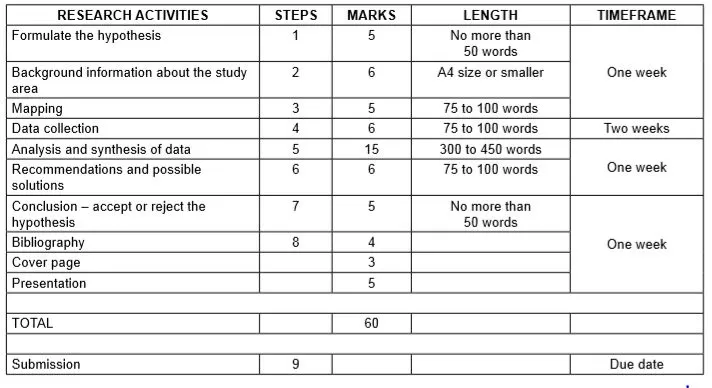
Step 1: Formulating a hypothesis/problem statement.
Guideline: geography grade 12 research tasks.
Step 1: Formulating a hypothesis/problem statement. As Geographers we seek to understand and explain the interactions amongst humans, and between humans and the environment in space and time. This is achieved by asking questions or making informed geographical decisions. This entails the development of a hypothesis or a problem statement to be tested.
- You have to choose a specific area of study where a geographical problem exists.
- During this stage, a geographical question showing a problem is asked.
- Identify the problem from a local area.
- Formulate a hypothesis or a problem statement. (Hypothesis research is used to prove that certain variables are dependent on or independent of each other. Problem statement research is only to highlight that a specific problem exists in a specific community.)
- You should then follow the steps of research to ensure that the geographical question is answered.
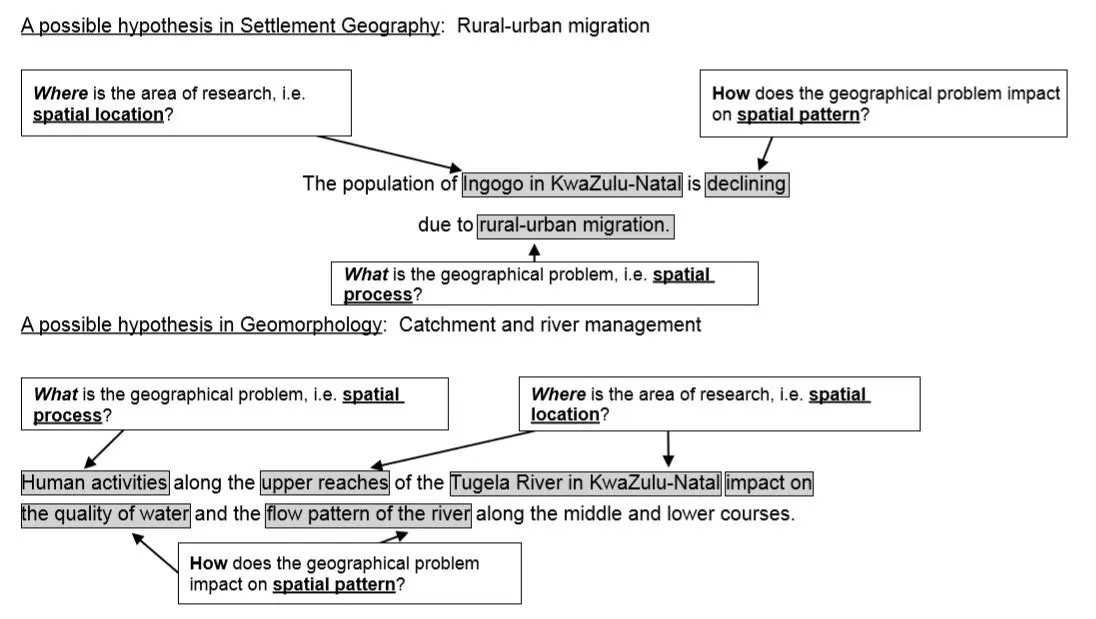
Geography Research Project Topics for Grade 12 South Africa
- The value of property along north-facing slopes is higher than the value of property along south-facing slopes in Meyersdal, Gauteng (choose local area).
- The cause of rural-urban migration in Ndwedwe, KwaZulu-Natal (choose local area), is the lack of service delivery in the health sector.
- Climate change will impact negatively on grape farming and related industries in the Western Cape.
- The closing down of many primary schools in Lusikisiki (Eastern Cape) (choose a local area) is due to a decline of the population in the age group 7 to 15 years.
- The poor condition of roads (specify the names of the roads) leading to/in Harrismith, Free State (choose local area), is due to the lack of proper planning by the local municipality.
- The impact of building a dam along the Jukskei River in Gauteng (choose local area) upstream of Alexandra will reduce flooding and the subsequent loss of life in Alexandra.
- The e-toll system will impact negatively on the economic position of people using private transport in Gauteng.
- The e-toll system will impact positively on traffic flow to the major urban centres in Gauteng.
- Informal settlements in the Vhembe district of Limpopo have low levels of development due to the lack of provision of basic needs (choose ONE informal settlement in your local area.)
- Overcrowding of informal settlements is due to the lack of proper planning by the local government (choose local area).
Step 2: Background information about an area of study
- You must explain where in South Africa the study area is located. (This can be indicated on the map.)
- Describe the study area in terms of its exact position (degrees, minutes and seconds).
- Provide relevant information about the area, for example population of the area or climate of the area.
Step 3: Mapping
- You must provide a map of the area in question.
- During this stage you must create a buffer zone around the area where the geographical problem exists.
- The map should have a clear legend/key and must be drawn to scale. The scale must be indicated on the map.
- If the map used covers a wider area, buffer zones around the area of study should be created.
- The map used should be the most recent map of the study area
Step 4: Methods of data collection
(a) PRIMARY DATA SOURCES
- The use of questionnaires
- Observations
- Field trips
(b) SECONDARY DATA SOURCES
- Newspaper articles
- Government department statistics
Step 5: Analysis and synthesis of data
• Learners must use collected data now to formulate a discussion around the existing geographical problem. • At this stage learners should represent some of the information graphically where necessary, for example graphs and sketches. • Learners must analyse graphic information during this stage.
Step 6: Recommendations and possible solutions
• Learners should now make recommendations to solve the geographical problem in question. • Learners should present their original and realistic opinions as far as they possibly can.
Step 7: Conclusion – accept or reject the hypothesis
- Learners should now take a decision to either ACCEPT or REJECT the hypothesis.
- Learners must give reasons for either ACCEPTING or REJECTING the hypothesis
Step 8: Bibliography
- Learners must include a comprehensive bibliography.
- Learners must list websites in full.
- Learners must include annexures of questionnaires and interviews conducted
View all # Geography-Grade 12 Study Resources
We have compiled great resources for Geography Grade 12 students in one place. Find all Question Papers, Notes, Previous Tests, Annual Teaching Plans, and CAPS Documents.
More Geography Grade 12 Resources
- Why do Tropical Cyclones Develop in Late Summer?
- What is the impact of coriolis force and latent heat on the development of tropical cyclones?
- Geography 2020 Past Papers
- Geography 2019 Past Papers
Grade 12 Geography Exam Papers and Memos for 2019 September and November
- Geography Grade 12 Research Tasks (Topics) and Memos
Useful Links
- Mid Latitude Cyclones Notes Grade 12
Geography Grade 12 2019 Exam Papers and Memos
Geography Grade 12 2020 Past Papers and Memos
Geography Mind the Gap study guide: Grade 12 Download
Read All Posts
Don't miss these:

GEOGRAPHY RESEARCH TASK GRADE 12 TERM ONE 2022
INSTRUCTIONS AND INFORMATION
- This task is to be administered and recorded in the first term.
- The task is allocated a time frame of 8 weeks in term one.
- Non-compliance of submissions according to the time frames set CAN result in zero mark for the candidate.
- The REASERCH TASK in grade 12 is part of the formal assessment programme in 2022
- All dates stated in Annexure A are stipulated for completion of the step.
- Candidates must adhere to the due dates stipulated in Annexure A.
- Candidates must always refer to the Research Rubric to gain more insight on the expectations for each step.
- What causes the natural event? (include a diagram)
- Where does it occur? (include a map)
- How does the natural event impact the environment?
- How does the natural event impact humans? social, political, economical?
- How can we prepare, prevent, protect against the natural event?
- How can communities' benefit from the natural event? Is this natural event a concern in my area?
Topics for Grade 12 Research Choose any ONE of the following topics to do research on Climate and weather
- An analysis of weather patterns and data over a longer period in your area.
- Strategies that help prepare for and manage natural weather disasters in the Free State.
- Local climates in your area and its impact on settlements and farming activities
- Pay close attention to the following aspects (Social, Economic, Environmental)
- Effects of Midlatitude/ Tropical cyclones on human activities,
- How cyclones affect the environment and human lives?
Geomorphology
- A study of processes and factors influencing flow patterns in local streams/rivers.
- A study on the human impact on the flow patterns of a river in your area.
- Catchment river management in the Free State.
- Choose a specific area where the geographical statement can be made.
- Where is it?
- What is it?
- How it ought to be?
- Human Impacts?
- Example: what? where? The pollution along the Vaal River is due to the increase in contaminants created by the human settlements.
- Provide a map of the area in question.
- During this stage create a buffer zone around the area of study
- The map must have a key and be drawn to scale.
- It should be a most recent map.
- Maps can be downloaded from websites
- Identify on the map where in South Africa the study area is located. (This can be indicated on the map)
- A description of the study area in terms of its exact position (degrees, minutes and seconds)
- Provide relevant information about the area, for example population of the area or climate of the area.
- Provide media (newspaper internet/magazine) sources
- Observations
- Field trips
- Newspaper articles
- Government department statistics
- Internet NB: due to Covid 19 restrictions, learners can only use Secondary data sources to limit contact. But the information used cannot be cut and pasto.
- Collected data should now be used to formulate a discussion around the existing geographical problem.
- Represent information graphically (creatively) where necessary, for example graphs, sketches, photographs etc.
- Graphic information must be analysed during this stage.
- Make recommendations to solve the geographical problem in question
- Present original and realistic opinions as far possible.
- STEP SEVEN Conclusion - ACCEPT OR REJECT the hypothesis. Make a decision to either ACCEPT or REJECT the hypothesis. Provide reasons for either ACCEPTING or REJECTING the hypothesis,
- List web sites in full.
- Annexures of questionnaires and interviews conducted should be included.
GEOGRAPHY RESEARCH TASK ANNEXURE A
Geographic question/inquiry To complete this research, we must be willing and have an ability to ask and answer
Related items
- Mathematics Grade 12 Investigation 2023 Term 1
- HISTORY PAPER 2 GRADE 12 ADDENDUM - NSC PAST PAPERS AND MEMOS JUNE 2022
- TECHNICAL SCIENCES PAPER 2 GRADE 12 QUESTIONS - NSC PAST PAPERS AND MEMOS JUNE 2022
- TECHNICAL SCIENCES PAPER 1 GRADE 12 QUESTIONS - NSC PAST PAPERS AND MEMOS JUNE 2022
- MATHEMATICS LITERACY PAPER 2 GRADE 12 MEMORANDUM - NSC PAST PAPERS AND MEMOS JUNE 2022

IMAGES
VIDEO
COMMENTS
Grade: 12 Quarter: Second Subject Title: Research/Capstone Project No. of Hours/ Semester: 80 hours Prerequisite (if needed): Subject Description: In this course, students, under the guidance of a research adviser, will identify a scientific, technological, or mathematical problem, design and apply an appropriate methodology, formulate ...
2.0.1 Guideline: Geography Grade 12 Research Tasks. 2.1 Geography Research Project Topics for Grade 12 South Africa. 3 Step 2: Background information about an area of study. 4 Step 3: Mapping. 5 Step 4: Methods of data collection. 6 Step 5: Analysis and synthesis of data. 7 Step 6: Recommendations and possible solutions.
Find 250 intriguing quantitative research themes for your Grade 12 project in the Philippines. Explore topics from education, health, social issues, technology, environment, economy, culture, and more.
Grade: 12 Semester: Second Semester Common Subject Title: Research Project No. of Hours/Semester: 80 hours/semester Pre-Requisites: Research in Daily Life 1 Research in Daily Life 2 Common Subject Description: This culminating activity develops critical thinking and problem solving skills through qualitative and quantitative researches.
School: Claudia Taylor "Ladybird" Johnson High School. School Address and Phone: 23203 Bulverde Road, San Antonio TX 78259. 210‐356‐0400 Students will develop a project around a social or environmental issue which is important to them. In groups, students will research their topic and write a précis with a works cited page.
Guidelines for the approach to the research assignment. 1. The assignment should be submitted with evidence of planning e.g mind map, draft, and management plan detailing a step by step approach to the assignment 2. There should be evidence that a variety of relevant sources were identified and used in completing the assignment 3.
Practical Research 2- Grade 12 ... For items 10 to 12, determine if the statement is: A. Always true C. Never true B. Sometimes true D. Cannot be identified 10. A nominal variable is expressed in numbers. ... Vital to the conduct of a quantitative research project is a deep understanding of its characteristics. When you know its strengths and ...
Description. In this lesson, students learn how to generate more specific inquiry questions to frame their research. In the beginning of the lesson, students engage in a research process check-in, during which they review the Student Research Plan Handout. This plan serves as a guide to the research process and a place to reflect on next steps.
The data were collected from Grade 12 Senior High School Academic Track students with the use of the English Speaking Attitude Questionnaire ... especially attitude, should be considered in language research. Senior High School students are expected to have better English language proficiency, especially their oral communication ability ...
This document provides an overview and guidelines for completing a Grade 12 research project. It outlines the key steps in the research process, including identifying a topic, formulating a hypothesis, planning and collecting information, organizing and analyzing the data, reaching conclusions, and listing sources. Typical topics that students could investigate are also listed. The document ...
GRADE 12 STEM Learn with flashcards, games, and more — for free.
RESEARCH PROJECT GRADE 12 TERM 2 MARKS: 50 FINAL DATE OF SUBMISSION: 18 MAY 2023 Teachers must provide learners with the research before 24 March 2023 2023 GRADE 12 ECONOMICS RESEARCH PROJECT TERM 2 INSTRUCTIONS 1. This is an individual task 2. The task is a research project and must be completed and submitted to your
1. identify the steps in designing a research project, 2. determine the guidelines in writing a research title, 3. craft a research project related to daily life, and ... Education Type K to 12 Grade Level Grade 11, Grade 12 Learning Area Content/Topic Health in the Arts Intended Users Educators, Learners
Geography Research Project Topics for Grade 12 South Africa. Step 2: Background information about an area of study. Step 3: Mapping. Step 4: Methods of data collection. Step 5: Analysis and synthesis of data. Step 6: Recommendations and possible solutions. Step 7: Conclusion - accept or reject the hypothesis. Step 8: Bibliography.
Grade 12 Research Project. Matric Overview. Welcome to the world of work! Strategies to Achieve Excellence Have goals Do class exercises Marry textbook info and class info on a weekly basis Study for Class tests and Cycle tests Revise often - e.g. mindmap Hand in all portfolio work - on time Do research project by first term Extra lessons ...
Grade: 12 Subject Title: Research/Capstone Project Quarter: Second No. of Hours/ Semester: 80 hours Prerequisite: ... K to 12 Senior High School STEM Specialized Subject -Research/Capstone Project December 2013 Page 1. of 3 (Enclosure No. 3 to DepEd Order No. 039, s. 2018)
SHS Contextualized_Research Project CG.pdf - Google Drive ... Loading…
SHS Contextualized_Research Project CG - Free download as PDF File (.pdf), Text File (.txt) or view presentation slides online. SHS Contextualized_Research Project CG
INSTRUCTIONS AND INFORMATION. This task is to be administered and recorded in the first term. The task is allocated a time frame of 8 weeks in term one. Non-compliance of submissions according to the time frames set CAN result in zero mark for the candidate. The REASERCH TASK in grade 12 is part of the formal assessment programme in 2022.
Grade 12 Research Project.ppt - Free download as Powerpoint Presentation (.ppt), PDF File (.pdf), Text File (.txt) or view presentation slides online. Scribd is the world's largest social reading and publishing site.
CCSS.ELA-LITERACY.W.11-12.1.A Introduce precise, knowledgeable claim (s), establish the significance of the claim (s), distinguish the claim (s) from alternate or opposing claims, and create an organization that logically sequences claim (s), counterclaims, reasons, and evidence. CCSS.ELA-LITERACY.W.11-12.1.B Develop claim (s) and counterclaims ...
The aims of our research is to help those Grade 12 students who took Science Technology Engineering and Mathematics strand that are struggling in performing the fundamental concepts of Mathematics. But before that, we need to identify their strengths and weaknesses by providing some test or exams.
Find lessons on Research Projects for all grades. Free interactive resources and activities for the classroom and home.
The April 12 celebration will feature 126 research projects presented by 254 Hope students. The presentations will feature posters illustrating the projects, with students on-hand to discuss their work. The displays fill the basketball and volleyball courts and concourse of the fieldhouse. The students and their projects will represent all of ...